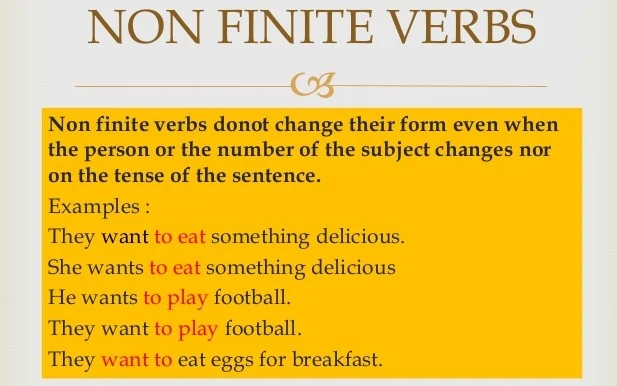What is Nonfinite Verb?
Definition of Nonfinite Verb
What is Nonfinite Verb
Examples of Nonfinite Verbs/Use of Nonfinite
Verbs in the Sentence
Types of Nonfinite Verb
Nonfinite Verb Exercises for you
We can define nonfinite verb as “A nonfinite verb is any of
several verb forms that are not finite verbs; that is, they cannot serve as the
root of an independent clause”.
What is Nonfinite Verb
Nonfinite verb differs from the finite verb in many ways. It
cannot be used in the sentence as root of an independent clause. They are also
called as verbals and divided into three types such as infinitives, participles
and gerunds. More than one nonfinite verb can be used in the sentence with
finite verb. Nonfinite verb is a type of verb without a subject and it doesn’t
show the tense or number in sentence. Nonfinite verbs do not work as predicate
verb in a sentence. Nonfinite verbs do not indicate the action of subject or
noun, tense, mood or gender in the sentence. They are commonly used in the
sentence as nouns, adverbs and adjectives as well as to form non-finite
clauses. For example:
- We
are reading (In this sentence: ‘we’ is a
subject; ‘are’ is a finite and ‘reading’ is a nonfinite verb as it does
not exhibit the tense or number).
- We
are writing a letter. (In this sentence: ‘we’
is a subject; ‘are’ is a finite verb and ‘writing’ is a nonfinite verb).
Examples of Nonfinite Verbs/Use of Nonfinite
Verbs in the Sentence
Following are examples showing the use of nonfinite verbs in the
sentence:
- Papers
have been correctly checked by the
teacher.
- What
do you want to have done about
celebration?
- We
tried to deny to accept the
invitation.
- My
father is trying to get the papers.
- He weeps a
lot. (is finite verb) whereas, He will weep a lot. (is
nonfinite verb)
- I tried to
give money. (Finite verb) and I have tried to give money.
(Nonfinite verb).
Types of Nonfinite Verb
Nonfinite verbs are classified into three types such as:
- Infinitives
- Participles
- Gerunds
Infinitives: Such type of nonfinite verb is considered the "base"
form and uses word ‘to’ before them. It functions as noun phrases, or modifiers
of nouns. Such as:
- He
needs to go to walk. (Nonfinite verb
phrase is ‘to walk’; it is acting as a noun)
- I
do not angry.
- He
made me angry.
- He
tried not to angry.
Participles: This type of nonfinite verb uses ‘-ing’ or ‘-ed’ as suffix. It
is used as an adjective modifying the noun. Such as:
- The sleeping gatekeeper
caused a delay. (Nonfinite verb is ‘sleeping’)
- He
is solving my issue.
- I
have solved the problems.
- Problems
were solved.
Gerunds: It appears in positions reserved for nouns. It also ends in
‘-ing’. They typically appear as the subject or object noun phrases. Such as:
- I
like drinking (Here the non-finite verb is
‘drinking’)
- Drinking milk is good.
- Jogging is good for health.
- I
have started jogging.
Nonfinite Verb Exercises for you
Nonfinite verb exercises given below will help you in analyzing
your knowledge about nonfinite verb. Just go through all the details given
above about the nonfinite verb and check your skill by doing following
exercises for nonfinite verb. We have used nonfinite verbs in the following
sentences; you need to check your skill by identifying nonfinite verbs in each
sentence:
- Are
you reading?
- I
struggle to live.
- He
can't go with her.
- He
has gone out of station.
- Going
faster is dangerous for kids.
- I
do not go to school.
- All
the teachers have gone away to the university.
- I
am going in the studio tonight.
- Reading
is good for mind.
- I
don’t have time to talk.
- I
am coming from the market.
- I
have to go, its urgent.
- I
want to go market.
- Cooking
is my favorite hobby.
- We
were dropped off at the camp.
- The
freshly cooked cookies are tasty.
- I
am going with her.
- I
like going to the swimming.
- Doctor
suggested me going for a walk daily.
- I
saw her going up the stairs.
- The
sleeping watchman is very careless.
- I
saw a snake going across the river.
Answers: 1 – reading, 2 – to live, 3 – go, 4 – gone, 5 – Going, 6 – go,
7 – gone, 8 – going, 9 – Reading, 10 – to talk, 11 – coming, 12 – go, 13 – go,
14 – Cooking, 15 – dropped, 16 – cooked, 17 – going, 18 – going, 19 – going, 20
– going, 21 – sleeping, 22 – going
Related Page:
|
|













No comments